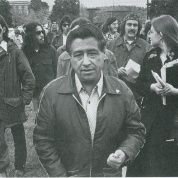The United States is honoring labor leader Cesar Chavez with a national holiday in his name on Saturday, at the same time a Texas-based hate group is trying to rename the holiday 'National Border Control Day.'

RELATED:
Journalist Chronicles Decade of 'Undocumented' Lives in Photos
"March 31 is the birthday of late civil rights icon Cesar Chavez: Chavez, founder of the United Farm Workers union, was a fierce opponent of illegal immigration and supporter of tight border controls," says a website dedicated exclusively to promoting the event.
Meanwhile, alt-right and anti-immigration groups are claiming Chavez was an anti-immigration unionist by taking an episode of his life out of context, magnifying it and ignoring further developments. They have also filed an official petition.
Republican Representative and Tea Party Member Louis Gohmer introduced a resolution to the House of Representatives "expressing support for the designation of Cesar Chavez's birthday, March 31, as National Border Control Day" on March 20, hoping to rename the national holiday to meet their narrative of history.
The rebranding is supported by the 'low-immigration, pro-immigrant' Center for Immigration Studies (CIS), which describes itself as a "think tank devoted exclusively to research and policy analysis of the economic, social, demographic, fiscal and other impacts of immigration on the United States." The Southern Poverty Law Center, however, classifies the CIS as an anti-immigrant hate group.
But what is it in Chavez's history that makes alt-right groups believe he was actually a border ranger opposing illegal immigration?
"Chavez's core insight was based on the law of supply and demand: flooding the labor market with people from abroad undermines American workers trying to improve their lot in life," says the National Border Control Day website.
Chavez co-founded the National Farm Workers Association (later renamed the United Farm Workers, or UFW) along with Dolores Huerta in 1962.
The union had more than 50,000 members at its height – mostly low-income Latino agricultural workers – and fought for better work conditions for agricultural laborers, including a reduction in exposure to harmful pesticides.
But Chavez and supporters of the union's causes were worried that the Bracero Program, which ran from 1942 to 1964, would undermine their efforts by bringing Mexican low-cost labor into the country, diminishing the impact of their strikes.
The increasing presence in U.S. fields of undocumented workers, who were being hired to replace workers on strike, led Chavez to oppose their presence and support tighter border control. Chavez even referred to them as "wetbacks" and "illegals," turning them into immigration authorities in 1974.
In 1973 a group within the UFW, led by Chavez's cousin Manuel, established a 'wet line' along the border to prevent illegal immigration. The 'patrolling' turned violent and protesters attacked people who were trying to cross, deeming them 'strikebreakers.' Chavez didn't take part in that event, but the action remains a stain on the union's history.
What Chavez and the UFW were opposing was the unfair and abusive practice of bringing undocumented workers, for a fraction of the price, to break workers' strikes and ignore their legitimate demands. The constant flow of cheap labor also affected immigrant workers, who could protest or join the union because they would be easily replaced by the same Bracero Program.
That's the part of history the alt-right groups are recovering to meet their agenda, ignoring the evolution of Chavez's ideas and the UFW's struggles. Chavez's legacy includes those episodes, but it's much more complex than that.
As the fight for justice continued and political contexts evolved, Chavez and Huerta became leading figures in the Mexican-American rights movement, actively participating in the La Raza Unida Party.
The new political turn led Chavez to reaffirm its class solidarity by fighting against the exploitation of all farm workers, regardless of their immigration status.
RELATED:
In the same year that Manuel and a faction of the UFW were setting up the 'wet line,' the UFW as a whole was opposing a federal law requiring verification of employees' immigration status.
Also, Chavez and the UFW supported then-President Ronald Reagan's amnesty for three million undocumented immigrants in 1986, which later led to their naturalization.
Even though he was not the perfect progressive leader and has been criticized for his authoritative tendencies within the union, Chavez was a strong advocate of workers' rights and as such ended up supporting the rights of all workers, regardless of their country of origin.
Currently, about 95 percent of UFW's members are immigrants.
Cesar Chavez Day was proclaimed a national commemorative holiday in 2014 by President Barack Obama, at the same time a biographical movie about the union leader directed by Mexican actor Diego Luna was reaching U.S. cinemas.
"I encourage Americans to make this a national day of service and education by speaking out, organizing and participating in service projects to improve lives in their communities," Obama said in March 2014. "Let us remember that when we lift each other up when we speak with one voice, we have the power to build a better world."